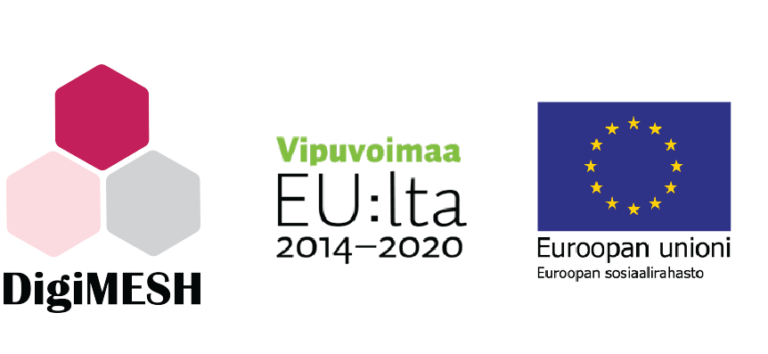A successful example of cross-sectoral collaboration – International Working Women of Finland ry in the DigiMESH project

In the autumn of 2022, the International Working Women of Finland Assosiation (IWWOF in short) was invited to a panel discussion organized by the European Migration Network Finland Conference: “Diversity of Migrant Women – How to improve labour market integration of migrant women?”. Opening the conference, the Minister of Employment, Tuula Haatainen, stressed the importance of cross-sectoral collaboration as well, stating that all actors should collaborate in finding solutions and promoting integration in Finland.
The Finnish government has been preaching for years now for a more structural cross-sectoral collaboration for all the actors involved in supporting international talents in the country. Despite the requests, at IWWOF we have noticed a sort of “competition” among those actors to obtain the available funding to promote similar ideas and solutions over the years. Some of the actors, such as municipalities, higher education institutions, and well-established organizations, have the capacity and experience to elaborate and manage those funding requests, leaving the crumbs to smaller organizations like IWWOF. However, in the DigiMESH project, we have brought different actors together to build more impact.
Including the target group in the project
But from IWWOF’s experience, the difficulties that many employers are facing in welcoming international talents stand even when the cross-sectoral collaboration needs to be formulated; weak or nonexistent Finnish language skills of international representatives of NGOs are considered an obstacle for those partnerships, even if having international talents in the project could improve its reputation and achievements.
What happens when international talents are welcomed in the projects? IWWOF was invited to the DigiMESH with the other major partners: Turku and Tampere Universities of Applied Sciences. The first contact took place in the autumn of 2021 by Turku University of Applied Science: the senior lecturer Hanna Kirjavainen knew the IWWOF organization from previous projects and She believed our members were the target audience for the DigiMESH projects. The three organizations finalized the formulation of the project proposal to the funder. Once the project got funding, we started collaborating on a weekly basis and after a year and a half, we would like to summarize what are the mutually beneficial points of the collaboration.
Support in sharing experience in funding application and management
IWWOF was founded in 2019 by a group of volunteers with no experience in the third sector. The founders did have some previous experience on business, however. With little experience in the funding application process, we had great support from Turku University of Applied Sciences, the DigiMESH project coordinator, on the funding application and insights on funding management. Alone we had no chance to apply in such a complex process.
Switching the language to English and supporting the use of the Finnish language when comfortable
As we mentioned, the language barrier is the biggest obstacle for international talents to enter not only workplaces but even to become part of cross-sectoral projects. Among the international community, there is a feeling of estrangement when the support comes from a group of local people with no connection or knowledge of the community. Having an organization that is actively supporting the community gives validation to the project. When IWWOF joined the DigiMESH project, all the other partners made a great effort to switch to English in all communications. On the rare occasions when there has been a need to use Finnish, the partners have made sure the message got through. Little by little our project worker has felt more and more comfortable and actively listened to Finnish during meetings, while still using English to communicate.
Access to a vast network and actors in the field
IWWOF has built a vast network in a short amount of time but still, due to the cited barriers, we have not been able to reach all actors involved in supporting international talents in the country. Working together with established institutions like Tampere UAS and Turku UAS has allowed us to enlarge our network and collaborate with more and more institutions.
What are the benefits that we believe IWWOF has provided to the DigiMESH project? We have already cited the accreditation of the project as being part of the international community. If we analyse in more detail, we can focus on two main aspects.
Unique expertise and knowledge of the target audience
IWWOF has brought a deep knowledge of the target audience: in our community, we have over 8800 members who have experienced all the issues of international talents trying to integrate and find their work path in the country. Within our team, we have expert liaisons to all the major fields like corporate, SMEs, startups, academics, municipalities, and public sector. IWWOF has delivered over 250 workshops to improve work-life skills in the past four years. We have shared that expertise with the DigiMESH partners and we were, and still are, able to create resources and events that produced true impact for our community.
Avoid expensive surveys
Many pieces of research have been commissioned in the past years to understand the need and struggles of the international community in Finland. And a lot of financial resources have been channelled on those surveys. The international community in Finland is relatively small and there is now a clear sense of disillusion towards those surveys; the needs and struggles should have been clarified by now and precious resources should be invested in creating solutions. DigiMESH has been a pleasant experience even on this matter: IWWOF knowledge and expertise, together with previous project experience like the previous MESH project, have been considered and the project resources have been utilized to create tools and events to really support the international community. In DigiMESH, financial resources have not been invested in cited surveys.
In conclusion, IWWOF had a positive experience in being part of its first cross-sectoral project. We hope this is the first pilot for many more similar projects in the future.
Text: Lucia Vuillermin, project partner and director of operations, International Working Women of Finland
Photo: Mike van Schoonderwalt, Pexels
